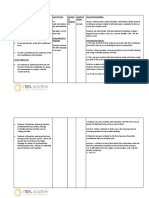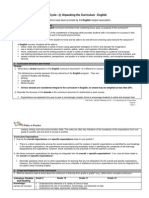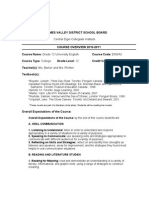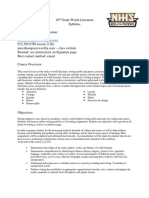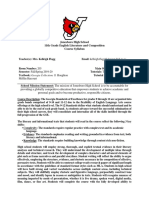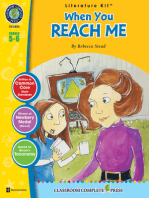Course Outline ENGLISH 10
Uploaded by
Flora FengCourse Outline ENGLISH 10
Uploaded by
Flora FengEarl Haig ENG2D1 English Grade 10
Secondary Evaluation Profile and Outline Academic
School
Course Description/Rationale/Overview
This course extends the range of oral communication, reading, writing and media literacy skills that students need for success in
their secondary school academic programs and in their daily lives. Students will analyze literary texts from contemporary and
historical periods, interpret and evaluate informational and graphic texts, and create oral, written, and media texts in a variety of
forms. An important focus will be on the selective use of strategies that contribute to effective communication. Students in Grade
10 will also write the provincial-wide Literacy Test in March and in-class preparation as well as extra after-school sessions will
be offered.
Prerequisite: English, Grade 9, Academic or Applied
Class Requirements Course Requirements/Department Policies
Student Responsibility Late Assignments
Students must seek assistance from Late assignments must be accompanied with a note signed by a parent or guardian
fellow students and the teacher for all stating the reason for tardiness of the assignment. The note must list the due date
work missed due to absence and must of the assignment and the actual date of submission.
make arrangements to complete missed If an assignment is handed in after it has been taken up/handed back, the student
work. may not receive a mark for it.
Missed Tests
It is the student’s responsibility to make arrangements, ahead of time, for any
tests/quizzes that are missed. If a student misses a test/quiz for an unforeseen
reason such as illness, the student must bring a note signed by a parent or guardian
and be prepared to write the test/quiz immediately upon return to school.
Assessment Strategies
Personal response journals, book responses, checklists, rubrics, supported opinion essays, performances and demonstrations, oral
presentations, role playing, teacher observation, timed in-class writing, teacher-student conferences, peer checklists, cooperative
learning, visual or graphic organizers, self-evaluation, problem solving.
Curriculum Strands and Weighting Achievement Categories Learning Skills
• Reading 30% • Knowledge and understanding • Works Independently
• Writing 30% • Thinking and inquiry • Team work
• Communication • Organization
• Oral literacy 20% • Work Habits
• Application
• Media Studies 20% These achievement categories are contained • Initiative
and evaluated in the curriculum strands. • Self -Regulation
• •
Evaluation FINAL MARK
TERM MARK BREAKDOWN
Each term will be based on: Year’s Work: 70%
• Personal response journals Final Summative Evaluation 30%
• Demonstration of critical thinking skills
• Responses to literature
• Analysis of literary and dramatic techniques
• Creative, persuasive and informational writing, for different audiences
and purposes, in a variety of forms
• Revising writing, with a focus on ideas, clarity, accuracy and coherence
• Editing to produce final drafts, using the writing process
Earl Haig ENG2D1 English Grade 10
Academic
Secondary Evaluation Profile and Outline English Department
School
Course Outline
Texts
Anthology: Sightlines 10
Reference: Resource Lines 9/10
Media: Selections from Mass Media and Popular Culture
Shakespeare: Romeo and Juliet or Julius Caesar
Novels selected from: Balzac and the Little Chinese Seamstress, The Catcher in the Rye, Three-Day
Road, Of Mice and Men, Lord of the Flies, Great Expectations, Mr. Pip, Who Has Seen the Wind, The
Kite Runner or another appropriate novel.
Student-Produced Media Texts – Media studies are an important component of the English curriculum. The
following are examples of potential student-made media texts that provide students with opportunities to
demonstrate expectations: creating their own advertisements; movie posters; verbal-visual essays; a news report.
You might also like
- KVS Chennai Region Class Xi Mathematics Half Yearly Examination Question Paper75% (4)KVS Chennai Region Class Xi Mathematics Half Yearly Examination Question Paper4 pages
- English Language Arts Grade 7 Course SyllabusNo ratings yetEnglish Language Arts Grade 7 Course Syllabus7 pages
- Academy Park High School: Course Syllabus English INo ratings yetAcademy Park High School: Course Syllabus English I3 pages
- Course Overview Fall 2016 9Th Grade Literature & Composition Ms. RaglandNo ratings yetCourse Overview Fall 2016 9Th Grade Literature & Composition Ms. Ragland4 pages
- Pope John Paul II High School Creative Writing Course Outline 2016 2017No ratings yetPope John Paul II High School Creative Writing Course Outline 2016 20174 pages
- 2014-15 Honors Freshman Course Expectations English BurtNo ratings yet2014-15 Honors Freshman Course Expectations English Burt8 pages
- AP English Language and Composition Syllabus Ms. Kate CroweNo ratings yetAP English Language and Composition Syllabus Ms. Kate Crowe6 pages
- Forbes College Prep English Syllabus 2022-23No ratings yetForbes College Prep English Syllabus 2022-237 pages
- 10th Grade World Literature Syllabus For WebpageNo ratings yet10th Grade World Literature Syllabus For Webpage5 pages
- Forbes College Prep English Syllabus 2024-25No ratings yetForbes College Prep English Syllabus 2024-256 pages
- Good Hope Country Day School English 9 2015-2016 Course SyllabusNo ratings yetGood Hope Country Day School English 9 2015-2016 Course Syllabus3 pages
- 10th Grade English SYg7fp87f8roovLLABUSNo ratings yet10th Grade English SYg7fp87f8roovLLABUS6 pages
- Understanding Is Better Than Just Knowing KnowledgeNo ratings yetUnderstanding Is Better Than Just Knowing Knowledge7 pages
- Instant ebooks textbook Pufendorf s International Political and Legal Thought 1st Edition Peter Schröder download all chapters100% (22)Instant ebooks textbook Pufendorf s International Political and Legal Thought 1st Edition Peter Schröder download all chapters81 pages
- Diploma in Building Services EngineeringNo ratings yetDiploma in Building Services Engineering3 pages
- Assessment of College Students' Knowledge and Attitudes Toward Solid Waste Management in North Central Zone of NigeriaNo ratings yetAssessment of College Students' Knowledge and Attitudes Toward Solid Waste Management in North Central Zone of Nigeria6 pages
- haascnc.com-40T - Gearbox - Troubleshooting Guide - CHCNo ratings yethaascnc.com-40T - Gearbox - Troubleshooting Guide - CHC29 pages
- GALPA MYLENE D. SCHOOL BASED PLANNING AND MANAGEMENT Written ReportNo ratings yetGALPA MYLENE D. SCHOOL BASED PLANNING AND MANAGEMENT Written Report6 pages
- Confi Guration Guide: Thrane & Thrane TT-3000SSA September 30th 2004No ratings yetConfi Guration Guide: Thrane & Thrane TT-3000SSA September 30th 20048 pages
- 5 Ways To Reduce Exam Stress When Few Days Left in ExamNo ratings yet5 Ways To Reduce Exam Stress When Few Days Left in Exam4 pages
- Course Synthesis Matching Type (4 Items X 2 Points) Column A Column BNo ratings yetCourse Synthesis Matching Type (4 Items X 2 Points) Column A Column B2 pages
